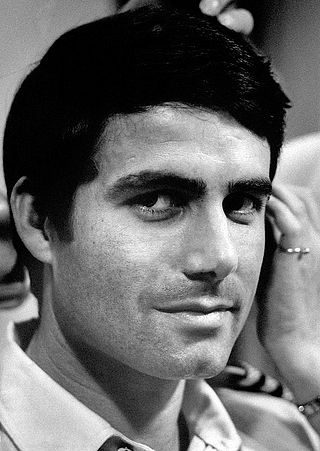
Francesco "Nino" Castelnuovo was an Italian actor of film, stage and television, best known for his starring role as Guy Foucher in the French musical film The Umbrellas of Cherbourg (1964).

Ermanno Olmi was an Italian film director and screenwriter best known for directing Il Posto (1961) and The Tree of Wooden Clogs (1977), which won the Palme d'Or. Throughout his career Olmi blended Italian neorealism with Christian humanism, with many of his films following humble characters through the spiritual trials of harsh conditions.
The Nastro d'Argento for Best Director is a film award bestowed annually as part of the Nastro d'Argento awards since 1946, organized by the Italian National Association of Film Journalists, the national association of Italian film critics.
The David di Donatello Award for Best Film is one of the David di Donatello awards presented annually by the Accademia del Cinema Italiano (ACI). The award recognizes the most outstanding Italian film theatrically released in Italy during the year preceding the ceremony. The award was first given in 1970, and became competitive in 1981.

Where's Picone? is a 1983 Italian comedy film directed by Nanni Loy.

Time for Loving is a 1983 Italian comedy film directed by Carlo Vanzina. It obtained a great commercial success and launched a short-living subgenre of revival-nostalgic comedy films. It also generated a sequel, Sapore di mare 2 - Un anno dopo. For her performance in this film Virna Lisi won a David di Donatello for Best Supporting Actress and a Silver Ribbon in the same category.

Buon Natale... buon anno is a 1989 Italian comedy drama film directed by Luigi Comencini. It is based on the 1986 novel with the same name by Pasquale Festa Campanile. For this film Virna Lisi was awarded with a Silver Ribbon for best actress. The film was coproduced with France where it was released as Joyeux Noël, bonne année.
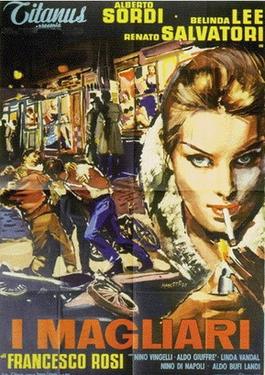
I magliari is a 1959 Italian drama film directed by Francesco Rosi. The film won the silver ribbon for best cinematography.

In una notte di chiaro di luna is a 1989 Italian drama film directed by Lina Wertmüller. It entered the competition at the 46th Venice International Film Festival.

Regina Bianchi was an Italian stage and film actress.

The Sparrow's Fluttering is a 1988 Italian romance drama film directed by Gianfranco Mingozzi.
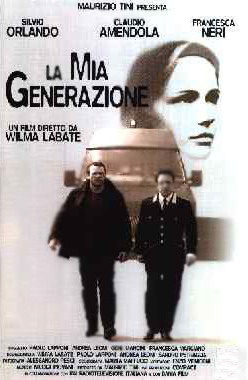
My Generation is a 1996 Italian drama film written and directed by Wilma Labate.
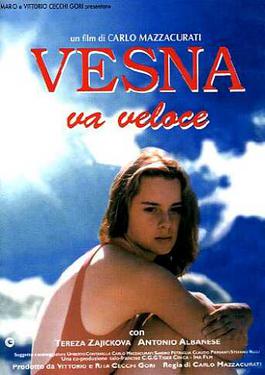
Vesna Goes Fast is a 1996 Italian drama film directed by Carlo Mazzacurati. It entered the competition at the 53rd Venice International Film Festival, in which Tereza Zajickova won a Pasinetti Award for Best Actress. The film also won the Ciak d'Oro for best sound.
Saverio Marconi is an Italian stage director and actor.

Ligabue is a 1978 Italian biographical drama film directed by Salvatore Nocita. It depicts real life events of painter Antonio Ligabue. It is based on a book by Cesare Zavattini. For this film Nocita was awarded Nastro d'Argento for Best New Director, while Flavio Bucci won the Nastro d'Argento for Best Actor.
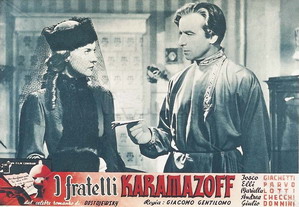
The Brothers Karamazov is a 1947 Italian historical drama film directed by Giacomo Gentilomo and starring Fosco Giachetti, Lamberto Picasso and Mariella Lotti. It is based on the 1880 novel of the same title by Fyodor Dostoyevsky. It won two Nastro d'Argento Awards, for best screenplay and for best score. The film's sets were designed by the art director Alberto Boccianti.

Quanto è bello lu murire acciso, also known as The Expedition and How Wonderful to Die Assassinated, is a 1976 Italian historical drama film directed by Ennio Lorenzini. It depicts the failed expedition organized by Carlo Pisacane in 1857 to provoke a rising in the Kingdom of the Two Sicilies.
Lidia Broccolino is an Italian film, television and stage actress.
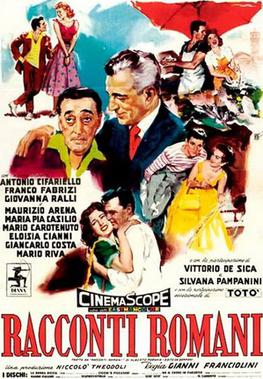
Roman Tales is a 1955 Italian comedy film directed by Gianni Franciolini. It is based on several short stories collected in Racconti romani by Alberto Moravia. The film won two David di Donatello Awards, for best director and best producer.

The Moon in the Mirror is a 1990 Chilean drama film written and directed by Silvio Caiozzi. It was entered into the main competition at the 47th Venice International Film Festival; for her performance Gloria Münchmeyer won the Volpi Cup for best actress. The film was selected as the Chilean entry for the Best Foreign Language Film at the 63rd Academy Awards, but was not accepted as a nominee.















